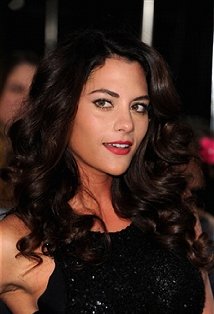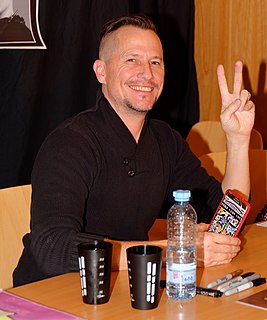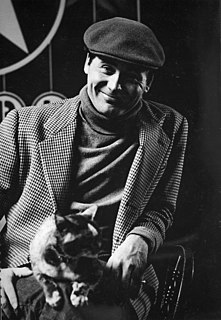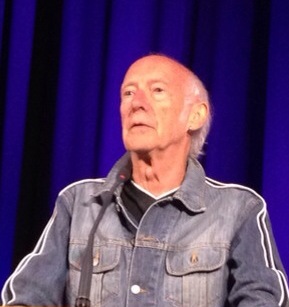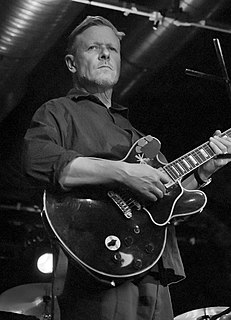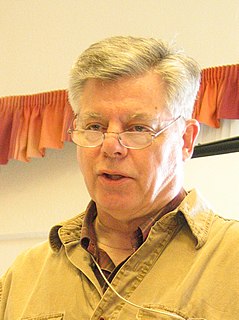Top 1200 Poetry Reading Quotes & Sayings - Page 7
Explore popular Poetry Reading quotes.
Last updated on November 15, 2024.
I was a violent, self-destructive teenager, who was adopted right at the end of World War II. I was lied to and abused by my parents. I hated life in Utah. I resented the Mormon Church, its sense of superiority and its certitude. I escaped through the Beat writers and discovered poetry and have devoted my entire life to the practice of poetry in varying ways. Poetry gave me a reason for being. And I'm not exaggerating when I say that.
When I was thirteen, I was in a supermarket with my mother, and for no reason at all, I picked up a science-fiction book at the checkout stand and started reading it. I couldn't believe I was doing that, actually reading a book. And, man, it opened up a whole new thing. Reading became the sparkplug of my imagination.
I would not recommend poetry as a career. In the first place, it's impossible in this time and place - in this culture - to make poetry a career. The writing of poetry is one thing. It's an obsession, the scratching of a divine itch, and has nothing to do with money. You can, however, make a career out of being a poet by teaching, traveling around, and giving lectures. It's a thin living at best.
If you examine the highest poetry in the light of common sense, you can only say that it is rubbish; and in actual fact you cannot so examine it at all, because there is something in poetry which is not in the words themselves, which is not in the images suggested by the words 'O windy star blown sideways up the sky!' True poetry is itself a magic spell which is a key to the ineffable.
Verse in itself does not constitute poetry. Verse is only an elegant vestment for a beautiful form. Poetry can express itself in prose, but it does so more perfectly under the grace and majesty of verse. It is poetry of soul that inspires noble sentiments and noble actions as well as noble writings.
I think the connection between poetry and theology, which is profound in Western tradition - there is a great deal of wonderful religious poetry - both poetry and theology push conventional definitions and explore perceptions that might be ignored or passed off as conventional, but when they are pressed yield much larger meanings, seem to be part of a much larger system of reality.
I think it's a great thing to hear the author reading. I've listened to CDs of Cheever and Updike reading their stories and Hemingway. To hear what their voices were like is amazing. Whether they're reading well or not, it's great to listen to the intonation and the beat of the guy who wrote the story.
A love of reading is an acquired taste, not an instinctive preference. The habit of reading is formed in childhood; and a child's taste in reading is formed in the right direction or in the wrong one while he is under the influence of his parents; and they are directly responsible for the shaping and cultivating of that taste.
This book is not about heroes. English poetry is not yet fit to speak of them. Nor is it about deeds, or lands, nor anything about glory, honour, might, majesty, dominion, or power, except War. Above all I am not concerned with Poetry. My subject is War, and the pity of War. The Poetry is in the pity.
So often we think, well, kids learn to read at school, I don't have to be responsible for that. But in fact they learn to love reading at home, and therefore it's really important that we as parents preserve the joy of reading by supporting them and reading things that speak to their hearts, books that they love.
Well-meaning adults can easily destroy a child’s love of reading: stop them reading what they enjoy, or give them worthy-but-dull books that you like, the 21st-century equivalents of Victorian “improving” literature. You’ll wind up with a generation convinced that reading is uncool and worse, unpleasant.
I'm a poetry-skipper myself. I don't like to boast, but I have probably skipped more poetry than any other person of my age and weight in this country - make it any other two persons. This doesn't mean that I hate poetry. I don't feel that strongly about it. It only means that those who wish to communicate with me by means of the written word must do so in prose.
Poetry is creative expression; Prose is constructive expression... by creative I mean original. In Poetry the words are born or reborn in the act of thinking... There is no time interval between the words and the thought when a real poet writes, both of them happen together, and both the thought and the word are Poetry.

